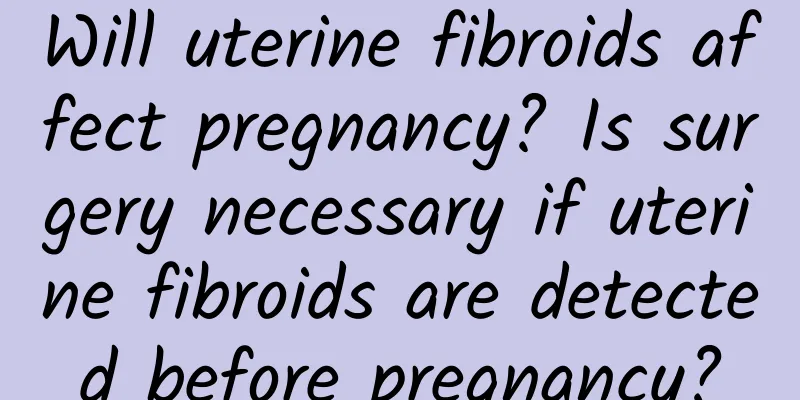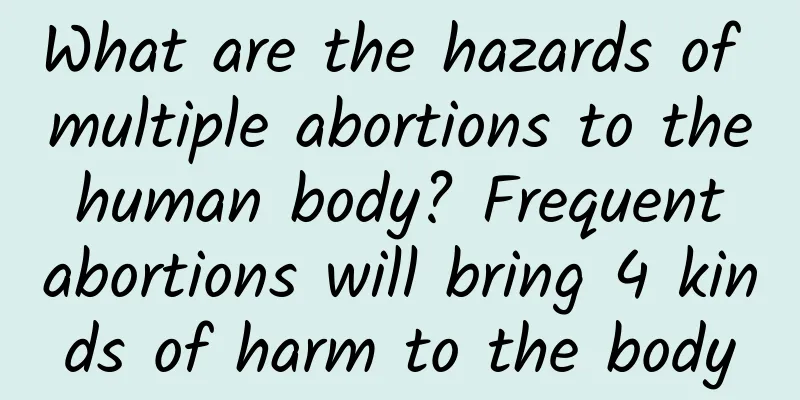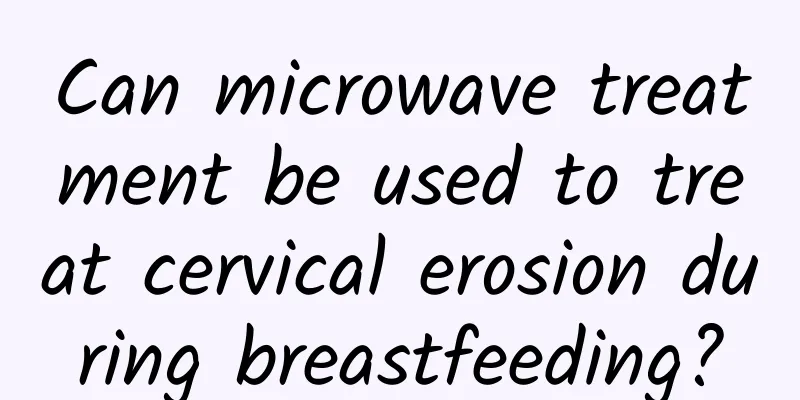Will uterine fibroids affect pregnancy? Is surgery necessary if uterine fibroids are detected before pregnancy?

|
Uterine fibroids are a common disease in women over 50. Some people even worry that they need to have their uterus removed because of uterine fibroids and can no longer have children. Will uterine fibroids affect pregnancy? Most fibroids are asymptomatic and can only be detected during a physical examination or other tests. Treatment of uterine fibroids does not require removal of the uterus. When uterine fibroids cause menorrhagia, prolonged menstruation, compression symptoms such as frequent urination, constipation or fertility requirements, and when the fibroids are large, uterine fibroid removal should be considered. Only when there are multiple fibroids and no fertility requirements can the uterus be removed directly to prevent recurrence. If you are approaching menopause, conservative treatment can be performed, and the fibroids will shrink after menopause. If fibroids are found, they should be reviewed every 3 to 6 months to detect the growth of the fibroids. The uterine cavity is divided into the mucosal layer, the myometrial layer, and the serosa layer from the inside to the outside. Generally speaking, subserosal fibroids have little effect on pregnancy, while fibroids that grow under the uterine mucosa have the greatest impact on pregnancy and have the highest rate of infertility. This is because submucosal fibroids will directly hinder the implantation of the fertilized egg, or because fibroids occur at the entrance of the fallopian tube, pulling or twisting the fallopian tube, and hindering sperm from entering the fallopian tube. Clinically, infertility caused by fibroids themselves is rare, and it is mainly caused by uterine fibroids caused by ovarian dysfunction. In addition, the size of the tumor has different effects on pregnancy. Generally speaking, if the tumor is less than 5 cm in diameter and has no obvious symptoms, it generally does not affect fertility, and the malignant change rate of uterine fibroids is relatively low. If uterine fibroids are found during pregnancy, we must closely monitor the size of the fibroids. If it is early pregnancy, the fibroids grow faster, so you should be more careful, cooperate with the doctor's treatment, and actively prevent threatened abortion. If the fibroids grow steadily, please monitor closely. Most pregnant women with uterine fibroids do not need a cesarean section. It is recommended that pregnant women follow the doctor's judgment and adopt an appropriate delivery method. Uterine fibroids detected before pregnancy Not necessarily removed If you discover that you have uterine fibroids during a pre-pregnancy checkup, you do not have to remove the fibroids before becoming pregnant. Whether to remove fibroids before pregnancy depends on the location and size of the fibroids. Generally speaking, fibroids under the uterine serosa have little effect on pregnancy. Fibroids smaller than 4 cm in diameter, with no obvious symptoms, usually do not affect fertility, and the probability of uterine fibroids worsening is low. These women often use the observation method (once every 3 to 6 months) B to understand the changes in fibroids, and can try to get pregnant. If fibroids are suspected to be the cause of infertility, or the patient is experiencing discomfort such as heavy menstrual flow, long menstrual cycles, abnormal urination, or if fibroids are difficult to distinguish from ovarian tumors, it is recommended to surgically remove the fibroids before considering childbearing. Most pregnant women Pregnancy can be carried to term However, many people neglect pre-pregnancy examinations, which leads to many people finding out that they have uterine fibroids during B-ultrasound examinations during pregnancy. At this time, pregnant women are most worried that uterine fibroids will affect the health of the fetus, leading to miscarriage, premature birth, etc. Although pregnant women with uterine fibroids may experience high miscarriage rates, incorrect fetal positions, high dystocia rates, high cesarean section rates, and postpartum hemorrhage, after pregnancy, as hormone levels in the body increase, uterine fibroids may continue to increase and may even lead to fetal maldevelopment and fibroid degeneration, but the incidence of these accidents is generally low, and most pregnant women can still carry their pregnancies normally to full term. So, what should pregnant women with uterine fibroids pay attention to in order to have a smooth pregnancy? Guo Ruixia suggests: 1. Extremely effective in preventing threatened abortion in early pregnancy. When pregnant women experience symptoms of threatened abortion such as abdominal pain and vaginal bleeding, they should immediately stay in bed to rest, keep a good mood, and strengthen nutrition. During this period, if the fibroids are not large, the patient does not have many complications, and does not request termination of pregnancy, it is not advisable to intervene in uterine fibroids, otherwise, it is easy to cause abortion. Actively prevent premature birth in the middle and late stages of pregnancy. If the uterine fibroids are not too large and the pregnant woman does not have obvious discomfort, regular prenatal examinations can be performed, and most of them do not need special treatment. It is only used as a last resort, such as when the fibroids compress the bladder and rectum, causing abnormal urination, or compressing the nerves, causing unbearable abdominal pain, and torsion of the subserosal fibroid pedicle. |
<<: Will having uterine fibroids affect pregnancy? What are the symptoms of uterine fibroids?
Recommend
What should women eat to improve ovarian function? Doctors recommend two types of food
Only when the ovaries function well can women hav...
Can pelvic inflammatory disease cause ectopic pregnancy in women?
Can pelvic inflammatory disease cause ectopic pre...
Can you get pregnant with endometriosis?
Women with endometriosis can get pregnant, but th...
Patients should pay more attention to the symptoms of cervical erosion
In recent years, the incidence of cervical erosio...
What are the symptoms of uterine fibroids? What are the symptoms of uterine fibroids?
Most patients with uterine fibroids do not have o...
The best hospital for treating hyperprolactinemia
Which hospitals have the best reputation for trea...
How to treat multiple ovarian cysts?
Although more and more attention is paid to the m...
Symptoms vary according to the type of dysmenorrhea
Traditional Chinese medicine believes that to tre...
Can I get pregnant with an ovarian cyst?
Whether or not a patient with an ovarian cyst can...
Are uterine and ovarian cysts serious? What are the dangers?
The severity of ovarian and uterine cysts depends...
Exercise to lose weight, anaerobic exercise vs. aerobic exercise, which one should you choose? Eat this after exercise to lose weight quickly
Exercise plays an indispensable role in successfu...
What to do if your period is delayed
Delayed menstruation is a common type of menstrua...
How thick is the endometrium during menopause?
Menopausal women should pay attention to endometr...
Which hospital is best for treating pelvic peritonitis?
As the number of patients suffering from pelvic p...
Patients with cervicitis should pay more attention to early signs
At present, more and more women in my country suf...









